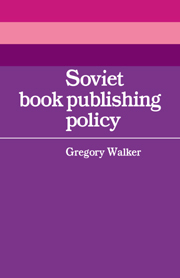Book contents
- Frontmatter
- Contents
- Acknowledgments
- Glossary of specialised terms
- Note on transliteration
- References to journals and series
- 1 Introduction
- 2 The political and economic view of Soviet publishing
- 3 The Communist Party
- 4 The government apparatus
- 5 The publishing-house
- 6 The author
- 7 Printing, paper and supplies
- 8 The book trade
- 9 Special kinds of publication
- 10 Conclusions
- Appendix 1 Authors' fee scales
- Appendix 2 All-union book retail prices
- Notes
- Select bibliography
- Index
9 - Special kinds of publication
Published online by Cambridge University Press: 07 October 2011
- Frontmatter
- Contents
- Acknowledgments
- Glossary of specialised terms
- Note on transliteration
- References to journals and series
- 1 Introduction
- 2 The political and economic view of Soviet publishing
- 3 The Communist Party
- 4 The government apparatus
- 5 The publishing-house
- 6 The author
- 7 Printing, paper and supplies
- 8 The book trade
- 9 Special kinds of publication
- 10 Conclusions
- Appendix 1 Authors' fee scales
- Appendix 2 All-union book retail prices
- Notes
- Select bibliography
- Index
Summary
In its application of instructions, priorities and incentives, Soviet book publishing policy distinguishes between many different kinds of book, categorised in a variety of ways. For some purposes, distinctions are drawn between works in different subjects, for other purposes they are drawn between works intended for different groups of reader, or recognition is given to the special conditions under which certain kinds of work are produced. The two main reasons for discrimination in treatment are to produce more of certain types of work (sometimes by producing fewer of others), and to produce works which are, by a variety of criteria, ‘better’. This chapter deals with important types of book identified in the administration of Soviet publishing, and describes the distinctive treatments accorded to each. Two major groups of book aimed at a general readership are considered: fiction, and ‘mass’ political and social literature. Books for more specific user groups are treated under the headings: textbooks; specialised scholarly works, in particular those in science and technology; and children's books. Finally, the following types of material are treated, which are prepared and published under special conditions: works published for libraries; works translated from foreign languages; and works published by, or on behalf of, organisations other than publishing-houses. The chapter ends with a short account of Soviet work in forecasting demand and output for different types of publication.
- Type
- Chapter
- Information
- Soviet Book Publishing Policy , pp. 102 - 121Publisher: Cambridge University PressPrint publication year: 1978



